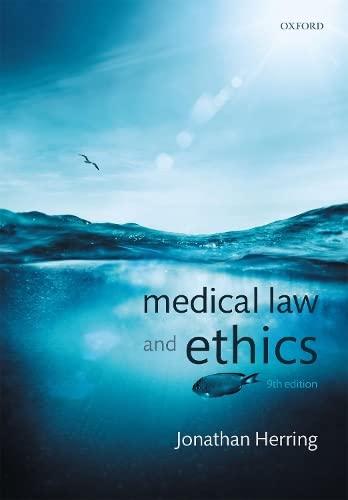Question
1. What did you think about it in relation to the chapter reading? 2. Did you learn something or did it help clarify something you
1. What did you think about it in relation to the chapter reading?
2. Did you learn something or did it help clarify something you read in the chapter?
3. Did it remind you of anything?
www.flcourts.org/resources-and-services/family-courts/family-law-self-help-information
CHAPTER TWO: CIVIL PROCEDURE
As previously noted, the areas of law are divided into the
Civil side
and the
Criminal side
. In
this Chapter, we will look at the Civil side. This course will not cover, in any detail, the
Criminal side.
C
IVIL PROCEDURE
consists of the rules followed by all case participants (including judges,
attorneys, and the parties to the civil case) to navigate through the court system in civil suits or
trials. Likewise,
C
RIMINAL PROCEDURE
consists of the rules followed by all the case
participants, (including judges, attorneys, and parties to the criminal case) to navigate through
the court system during a criminal trial.
S
UBSTANTIVE LAW
deals with the legal relationship between people, or the people and the state,
thus defining the rights and duties of people.
P
ROCEDURAL LAWS
define the rules by which Substantive laws are enforced in a court of law.
Procedural laws are necessary to ensure fair practice and consistency in the "due process" of the
law.
Examples:
Substantive law - Florida Statute Chapter 767.13
Attack or bite by
dangerous dog; penalties; confiscation; destruction.
o
(1)
If a dog that has previously been declared dangerous attacks or bites
a person or a domestic animal without provocation, the owner is guilty of
a misdemeanor of the first degree, punishable as provided in s. 775.082 or
s. 775.083.
Procedural law - Florida Statute Chapter 767.13
Attack or bite by
dangerous dog; penalties; confiscation; destruction.
o
(3)
If the owner files a written appeal under s. 767.12 or this section, the
dog must be held and may not be destroyed while the appeal is pending.
Due process
of the law prohibits any levels of government from arbitrarily or unfairly depriving
individuals of their basic constitutional rights to life, liberty, and property. The due process
clause of the Fifth Amendment, ratified in 1791, asserts that no person shall "be deprived of life,
liberty, or property, without due process of law." This amendment restricts the powers of the
federal government and applies only to actions taken by the federal government.
The Due Process Clause of the Fourteenth Amendment, ratified in 1868, uses the same eleven
words. It declares,"[N]or shall any State deprive any person of life, liberty, or property, without
due process of law". This clause limits the powers of the states and describes a legal obligation
of the states. This is the only decree that the US Constitution states twice.
www.law.cornell.edu/wex/due_process
Thus, there has to be a fair and impartial set procedure in place to ensure that as a Plaintiff or
Defendant, you are not unfairly deprived of money, possessions, freedom, etc.. that rightfully
belong to you. Therefore, because of the Due Process Clauses, every court has 'Rules of Civil
Procedures'. Now days, these are posted online. For example, Florida Civil procedures
required by the Florida Constitution are listed at
www.leg.state.fl.us/Statutes/index.cfm?App_mode=Display_Index&Title_Request=VI
The Orange County Ninth District Court rules are listed at
www.ninthcircuit.org/research/rules-
Step by Step Solution
There are 3 Steps involved in it
Step: 1

Get Instant Access to Expert-Tailored Solutions
See step-by-step solutions with expert insights and AI powered tools for academic success
Step: 2

Step: 3

Ace Your Homework with AI
Get the answers you need in no time with our AI-driven, step-by-step assistance
Get Started


